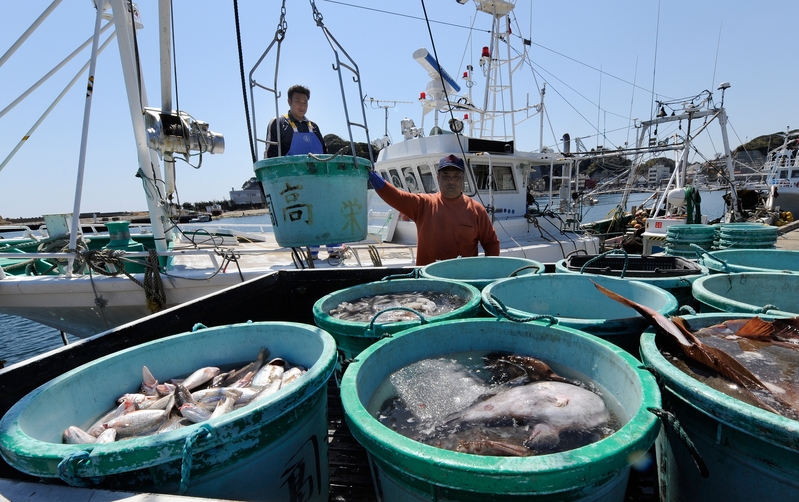Fishermen in Ibaraki Prefecture, Fukushima, Japan unload their catches ashore. After the 311 Fukushima nuclear disaster in Japan, although the production of agricultural products has gradually recovered, the amount of agricultural products sold overseas has dropped by 80% compared with that before the earthquake. (Toru Yamanaka/AFP/Getty Images)
[The Epoch Times, February 12, 2023](Reported by Epoch Times reporter Li Jing) The Chinese Communist Party’s CCTV and other official media have recently focused on the news that the radioactive substances in Japanese perch exceeded the standard. The report said that the perch caught by the Japanese side detected the radioactive substance cesium-137. The activity was 85.5 beck per kilogram (Bg) and the listing of local sea bass was suspended. However, some netizens checked the Chinese food radiation standards, and the official setting of cesium-137 activity was as high as 800 bec/kg, which was 16 times higher than the Japanese official standard.
According to CCTV reports, the Fukushima Prefectural Fisheries Cooperative Association issued a notice on February 7 that the local sea bass would be suspended from the market from now on due to the detection of radioactive cesium exceeding the standard in the sea bass caught in the waters near Fukushima Prefecture.
According to the report, the Fukushima Prefectural Fisheries and Marine Research Center stated that they received a notification from the Fukushima Prefectural Fisheries Cooperative Federation that the activity of radioactive cesium 137 detected in perch caught in the sea reached 85.5 bec/kg, exceeding the Federation’s The prescribed safety standard of 50 bec per kilogram.
Another official media said, “Even if the natural environment is ignored, does the Japanese government even ignore its own people?”
After the above-mentioned report was released, some Weibo netizens checked China’s national food radiation standards and found that the official levels of 12 types of radioactive substances in various types of food are all extremely high.
The Epoch Times reporter discovered that according to the “Limited Concentration Standards of Radioactive Substances in Food” formulated by the Ministry of Health of the Communist Party of China, the content of radioactive cesium-137 is as high as 800 bec per kilogram, which is 9 times higher than the amount of contaminated sea bass caught in Japan, and even higher than Fukushima. 16 times the standard of the Federation of Prefectural Fisheries Cooperative Associations.
Many Chinese netizens commented: “I don’t care about food safety in foreign countries. I only care about the safety of the meat, oil, rice, vegetables we eat, and the milk powder our children drink. Here we kill a pig and spend 20 yuan to cover a quarantine Zhang, as for how the pig was fed, no one will ask. All the quarantine procedures follow this process: payment, stamping, listing, and the Chinese outside the special supply have already been invulnerable to all poisons!”
“CCTV reports on Japan’s economic and social news. The content is either price increases or environmental pollution. Netizens are very experienced, and they will use domestic examples to criticize CCTV. Many standards in Japan are super strict, not only higher than China, but also higher. There are many in Europe and the United States, so this is not cold knowledge. It can only be said that the editing level of CCTV is too low.”
“CCTV is not the media, it is the mouthpiece. It is not their job to report the truth, but to create hatred and divert the domestic focus. The report of CCTV made it very clear that the Japanese sea bass exceeded the standards set by the Japan Fisheries Association. Of course, they It’s hard to go beyond the standards set by China.”
On March 11, 2011, a nuclear accident occurred at the Fukushima Daiichi Nuclear Power Plant in Japan. The accident was triggered by an earthquake off the coast of Japan and the accompanying tsunami.
On April 13, 2021, the Japanese government officially decided to discharge about 1.2 million tons of diluted nuclear treatment water (under inspection by the International Atomic Energy Agency’s safety standards) into the sea, and the official discharge is expected to begin in 2023.
Japan’s Kyodo News reported on February 8 that regarding the discharge of treated water from Tokyo Electric Power’s Fukushima Daiichi Nuclear Power Plant into the sea, Japan’s Ministry of the Environment presented at an expert meeting on the 7th that it would increase the number of tritium activity measurements of radioactive substances in surrounding seawater shortly after the start of the discharge. Monitor the plan and obtain general agreement.
Responsible Editor: Sun Yun#
